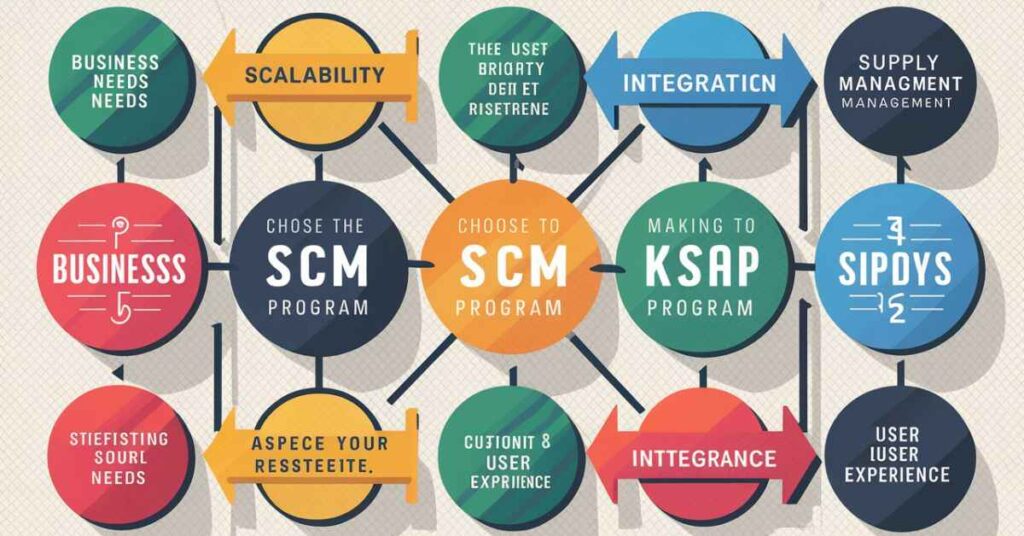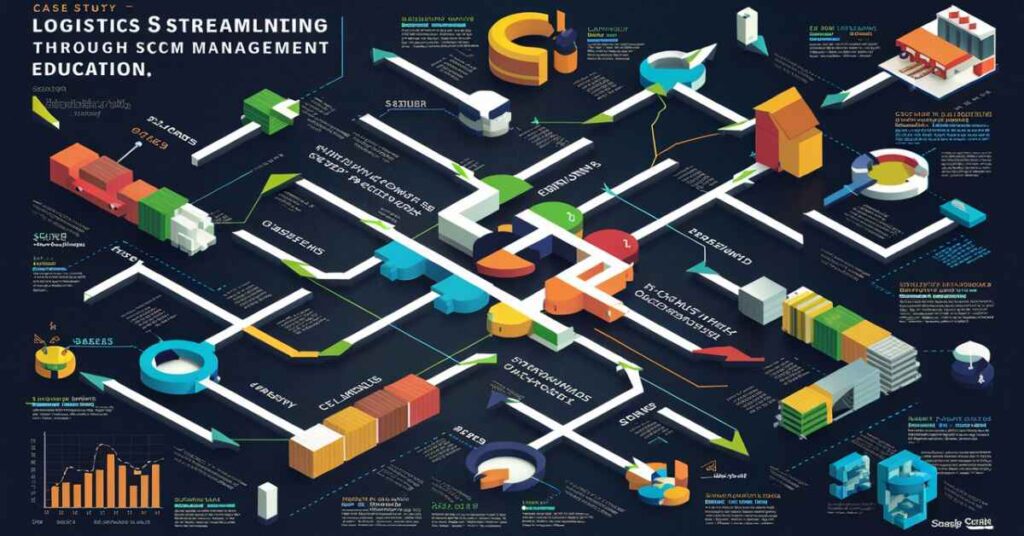In today’s fast-paced global economy supply chain management (SCM) has become a serious component of transportation and logistics production. As businesses strive to simplify their operations decrease costs and deliver products and services efficiently.
The demand for skilled SCM specialists is skyrocketing. If you’re considering a career in this dynamic field pursuing a specialized degree or certificate in SCM can open doors to profitable job chances and accelerate your professional progress.
Why Pursue a Specialized SCM Degree or Certificate?
Getting a dedicated SCM degree or credential can provide you with an important competitive edge in the job market. Here are some compelling reasons to consider this path:
- In-depth Knowledge: You’ll gain comprehensive knowledge of logistics, transportation, and supply chain operations, equipping you with the skills to tackle complex challenges in the industry.
- Hands-on Training: Many SCM programs offer hands-on training in industry-specific tools and software, such as transportation management systems (TMS), warehouse management systems (WMS), and enterprise resource planning (ERP) applications.
- Problem-solving and Analytical Skills: Through case studies, simulations, and real-world projects, you’ll develop critical thinking, problem-solving, and analytical skills that are highly valued by employers.
- Networking Opportunities: SCM programs often facilitate networking opportunities with industry professionals, providing valuable connections that can lead to internships, mentorship, and future job prospects.
- Improved Job Prospects and Earning Potential: According to the Bureau of Labor Statistics, employment in logistics and supply chain management roles is projected to grow faster than the average for all occupations, with median annual salaries ranging from $74,000 to $116,000 for roles like logistics managers and supply chain analysts.
High-Growth Career Paths in Transportation & Logistics SCM

With a specific SCM degree or certificate, you’ll be well-positioned to shadow a variety of rewarding careers in the transport and logistics business. Here are some of the most gifted career paths:
1. Logistics Manager
As a logistics manager, you’ll be liable for overseeing the perfect logistics process from gaining and inventory management to transportation and delivery. You’ll work closely with suppliers’ carriers and customers to ensure timely and cost-effective delivery of goods and supplies.
Key Responsibilities:
- Developing and implementing logistics and supply chain strategies
- Optimizing transportation and distribution networks
- Analyzing data to identify areas for improvement and cost savings
- Ensuring compliance with regulations and industry standards
- Collaborating with cross-functional teams to streamline operations
Work Environment: Logistics managers typically work in office settings but may also visit warehouses, distribution centers, and other facilities.
Average Salary Range: According to Glassdoor the average salary for a logistics manager in the United States is around $75,000 per year.
2. Supply Chain Analyst
Supply chain analysts play a vital role in optimizing supply chain operations by studying data identifying bottlenecks and recommending solutions to improve efficiency and reduce costs.
Key Responsibilities:
- Collecting and analyzing supply chain data using various tools and techniques
- Identifying opportunities for process improvements and cost savings
- Developing and implementing supply chain optimization strategies
- Collaborating with cross-functional teams to address supply chain challenges
- Generating reports and presentations to communicate findings and recommendations
Required Skills: Strong analytical skills proficiency in data analysis tools (e.g., Excel, SQL, Tableau) problem-solving abilities excellent communication skills.
Job Outlook: According to the Bureau of Labor Statistics employment of management analysts including supply chain analysts is projected to grow 14% from 2020 to 2030 faster than the average for all occupations.
3. Transportation Coordinator
As a transportation director, you’ll be responsible for organizing and managing the movement of goods and materials ensuring timely and effective shipments.
Key Duties:
- Coordinating with carriers and logistics providers to arrange transportation
- Tracking shipments and monitoring delivery schedules
- Negotiating rates and terms with carriers and vendors
- Resolving transportation-related issues and delays
- Maintaining compliance with transportation regulations and policies
Career Growth: With experience, transportation coordinators can advance to supervisory or management roles such as transportation manager or logistics director.
Other potential roles in the transportation and logistics SCM field include warehouse manager. Procurement specialist distribution center manager, and import/export compliance specialist.
How to Choose the Right SCM Program
With the increasing popularity of SCM education, there are several degree and certificate programs available. To ensure you make the right choice consider the following factors:

- Accreditation and Reputation: Look for programs attributed by reputable organizations such as the Accreditation Council for Business Schools and Programs (ACBSP) or the Association to Advance Collegiate Schools of Business (AACSB). Search the repute of the organization and the program within the industry.
- Industry-Relevant Curriculum and Specializations: Evaluate the syllabus to ensure it covers essential topics such as logistics transportation supply chain operations project management data analytics relevant software and tools. Also consider plans that offer specialties aligned with your career goals, such as global logistics sustainability or e-commerce.
- Opportunities for Internships or Hands-on Experience: Practical involvement is invaluable in the SCM field. Look for programs that offer internships co-ops capstone projects with industry partners. Allowing you to apply your knowledge in real-world settings.
- Flexibility: If you’re a working expert consider programs that offer elastic options such as online or evening classes to provide somewhere to stay your schedule.
- Cost and Financial Aid Options: Explore the education fees and available economic aid options containing scholarships grants and employer tuition repayment programs.
Read this Blog: Pursuing a Stylish Career: Fashion Supply Chain Management with an SCM Degree
Top SCM Programs in [Your Target Location e.g., California]
If you’re based in several reputable institutions offer top-ranked SCM programs. Here are a few to consider:
1. [Program Name, University/College]
Program Overview:
- Degree/Certificate Offered: [e.g., Bachelor of Science in Supply Chain Management, Master of Science in Logistics]
- Concentrations/Specializations: [e.g., Global Logistics, Sustainability, Analytics]
- Unique Features: [e.g., Industry partnerships, experiential learning opportunities, state-of-the-art facilities]
Admission Requirements and Application Process:
- [List the key admission requirements, such as GPA, test scores, work experience, etc.]
- [Provide a brief overview of the application process and deadlines]
Success Stories/Testimonials: “The [Program Name] at [University/College] provided me with a solid foundation in supply chain management, coupled with hands-on experience through internships and real-world projects. The program’s emphasis on data analytics and industry collaborations prepared me well for my current role as a supply chain analyst at a leading logistics company.
Building a Competitive Edge in the Job Market
Earning a specialized SCM degree or certificate is a significant step. There are additional plans you can employ to stand out in the competitive job market:
- Earn Industry-Recognized Certifications: Consider pursuing certifications such as the Certified Supply Chain Professional (CSCP) from APICS the Certified Logistics Technician (CLT) from the Manufacturing Skill Standards Council (MSSC) or the Certified in Logistics Transportation, and Distribution (CLTD) from APICS. These certifications determine your commitment and expertise in the field.
- Develop Specialized Skills: In addition to core SCM knowledge focus on developing specialized skills that are in high demand such as data analytics project management expertise in specific industries (e.g. healthcare retail and manufacturing).
- Gain Practical Experience: Seek out internships co-ops or entry-level positions in the SCM field to gain applied experience and build your professional network. This hands-on skill can make you a more attractive applicant to possible employers.
- Build a Strong Professional Network: Attend industry events join professional organizations like the Council of Supply Chain Management Professionals (CSCMP) or the Institute for Supply Management (ISM) connect with experts on platforms like LinkedIn. A strong system can provide valuable insights job opportunities and mentorship.
- Continuously Update Knowledge: Stay up-to-date with the latest trends technologies and best practices in the SCM field by attending seminars workshops industry conferences. Unceasing learning will help you remain inexpensive and adapt to changes in the industry.
Case Study: Logistics Streamlining through SCM Education

ABC Logistics a leading transportation company, was facing challenges with inefficient supply chain operations, resulting in delays and increased costs. To address these issues, they implemented a comprehensive training program for their employees, focusing on supply chain management principles and best practices.
Through partnerships with local universities and industry organizations. ABC Logistics offered their employees the opportunity to pursue specialized SCM degrees and certifications. This initiative not only equipped their workforce with the latest knowledge and skills but also fostered a culture of continuous improvement and innovation.
The results were remarkable. Within the first year, ABC Logistics saw a 20% reduction in transportation costs and a 15% improvement in on-time deliveries. Employees who participated in the SCM programs reported feeling more engaged, empowered, and confident in their ability to contribute to the company’s success.
Conclusion
In the dynamic world of transportation and logistics pursuing a specialized degree or certificate in supply chain management can open doors to a wealth of lucrative career opportunities. By gaining in-depth knowledge hands on training practical skills through these programs you’ll position yourself as a valuable asset in the SCM field.
Incorporating relevant keywords such as “SCM jobs” “logistics careers “supply chain management programs” and their synonyms and related terms like “transportation coordinator” logistics analyst and warehouse operations your website’s content can significantly improve your search engine rankings and visibility.
As you embark on your journey in the SCM field remember that knowledge is the key that unlocks endless opportunities. Embrace the pursuit of specialized education, and you’ll be well-equipped to tackle the challenges and seize the rewarding career prospects that await in the dynamic world of transportation and logistics.


![Find a Section 8 houses for rent with no deposit Revealed! [2024]](https://busslirra.com/wp-content/uploads/2024/08/Find-a-Section-8-houses-for-rent-with-no-deposit-Revealed-2024-300x157.jpg)







![Find a Section 8 houses for rent with no deposit Revealed! [2024]](https://busslirra.com/wp-content/uploads/2024/08/Find-a-Section-8-houses-for-rent-with-no-deposit-Revealed-2024-150x150.jpg)
